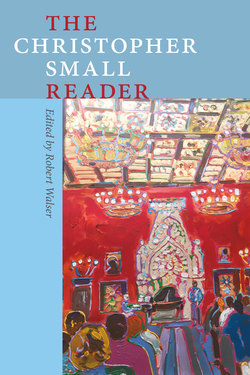The Christopher Small Reader

Реклама. ООО «ЛитРес», ИНН: 7719571260.
Оглавление
Christopher Small G.. The Christopher Small Reader
Отрывок из книги
The Christopher Small Reader
Music, Society, Education
.....
In his multiplicity Ives draws together many threads of American music and brings them to the surface from where they had lain, submerged and neglected, for more than a century. He celebrates the fact that what people play or sing is not necessarily the same as what they think they are playing and singing, and acknowledges their right to sing or play as they wish; indeed, given the right attitude in the listener, the result can be just as beautiful as more accurate or more formally disciplined music making.
Ives seems never to have seriously considered studying in Europe; those who did go to Europe either before or after him came back imbued with European attitudes, no matter how “American” they believed themselves to be. The music of Aaron Copland, Virgil Thomson, Roy Harris, even of Elliott Carter and Milton Babbitt, remains European-style concert music with an American accent, not unlike the nationalist concert music of such nineteenth-century composers as Smetana, Dvorak, Greig, whose national accents (this is not to deny their many virtues or even genius) remain mere dialects of the prevailing European polyglot. Of the generation following Ives, only Henry Cowell showed anything of Ives’s bent for uninhibited experimentation with sound, free from harmonic preconceptions. Cowell’s early pieces for piano, using tone-clusters (a term which was in fact invented by him) and plucked and rubbed strings may have been naïf (some were published while he was still in his teens) but their spirit was the same as had animated the eighteenth-century tunesmiths, and is directed towards liberating the inner nature of the sounds themselves. If his later work falls back into the European concert-music manner, albeit with an exotic seasoning, he had opened up some important new resources, and, as editor of the journal New Music, he became, in the words of John Cage, “the open sesame for new music in America … From him, as from an efficient telephone booth, you could always get not only the address and telephone number of anyone working in a lively way with music, but you could also get an unbiased introduction from him as to what anyone was doing. He was not attached (as Varèse also was not attached) to what seemed to many the important question: Whether to follow Schoenberg or Stravinsky.”21 The last is an important point; to be aware of the essential irrelevance of both Schoenberg and Stravinsky (obscured by the fact that both composers were resident in the United States, Schoenberg since 1934 and Stravinsky since the 1940s) to the growth of a genuinely American tradition was a state which Cage himself reached only in later life.
.....